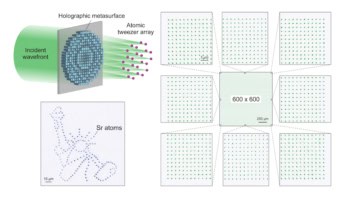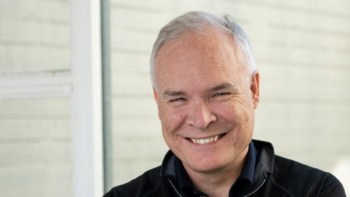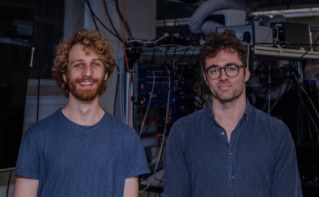Will the patents taken out on quantum computers expire before such computers are ever built? Paul Guinnessy investigates.
Quantum information is one of the hottest research topics in physics today. Theorists and experimenters across the globe are devising new ways to exploit the quantum properties of light and matter in novel forms of computation and communication. Although a real quantum computer is still decades away, so-called quantum cryptography has already been demonstrated across commercial optical-fibre networks and is very close to real-world applications.
Indeed, a search of patent offices on the Web reveals that Paul Townsend of British Telecom in the UK has four patents on various aspects of quantum cryptography dating back to 1994. Other patents are held by Nicolas Gisin of the University of Geneva and co-workers, and by John Rarity and Paul Tapster of the Defence Evaluation and Research Agency in the UK. The Los Alamos National Laboratory in the US is also patenting recent work on free-space quantum cryptography (see Quantum cryptography takes to the air).
Quantum cryptography relies on quantum entanglement, a correlation between quantum particles that is much stronger than any classical correlations. It allows the “keys” needed to encrypt and decrypt information to be distributed with absolute security. Quantum cryptography offers governments, banks, the military and other users of cryptography levels of security that are not possible with the existing techniques.
Quantum computation, on the other hand, relies on the ability of quantum particles to be in two states at the same time. In theory this built-in parallelism will allow quantum computers to perform certain types of calculation that would take too long – or would be impossible – on a classical computer. Simple quantum logic gates have already been demonstrated in the lab, but all researchers agree that it will be very difficult to build a working quantum computer. Others argue that it will be impossible.
So is it worth obtaining patents related to quantum computing, given that the technology needed will only become practical several decades from now? A small number of such patents have been awarded, mostly to researchers working in industry. Indeed, it is standard policy at many companies to patent all discoveries by their employees, even if the researchers think that the patent will expire before it ever makes any money. Most patents last for 20 years.
Other researchers say that patent offices currently do not have enough technical staff who can understand the research behind some applications. This, they claim, may have led to some dubious patents being awarded. “I suspect that some of the patents may make claims that are excessively broad, ” says Peter Shor, a leading researcher in quantum computation at AT&T in the US. “This is a problem for patents in all fields, but I think it is especially likely to be a problem in newly discovered fields.”
“My general view is that patents have had almost no influence on the course of quantum computing, ” says David DiVincenzo of IBM Research in Yorktown Heights, New York. “It is standard IBM policy to patent new discoveries, but I consider quantum computing too far from application for patents to be of much significance.”
That view is echoed by Chris Monroe, a member of the team that built the first quantum logic gate at the National Institute of Standards and Technology in Boulder, Colorado: “Our group has not considered obtaining patents, primarily because we are sceptical that a useful quantum computer will even exist in the next two decades. Of course, there is always the chance that some breakthroughs will occur that will vindicate researchers who are now obtaining patents, but it is more likely that these patents will expire well before their possible usefulness.”
Daniel Gottesman, a physicist at Los Alamos who has applied for a patent on quantum error correction, agrees: “It is quite likely that patents granted today will expire before they can become useful. Of the small-scale quantum computers that have already been demonstrated experimentally, none has the potential to scale up to a commercially useful size without an additional technological breakthrough. People who concentrate on patents instead of publications will find themselves ignored.” Gottesman adds that he hopes that the patent office takes its time with his application as this will give his patent more time to amount to something.
Others are more optimistic. “The only quantum information-processing technology that has commercial applications in its current form is quantum cryptography, ” says Seth Lloyd at the Massachusetts Institute of Technology. “But quantum technologies are improving rapidly, and it seems quite likely that some such technologies will see commercial use in the not so distant future.”
One point on which most experts agree is that the patent with most commercial potential has been awarded to Peter Shor for a quantum error-correcting code. “If my patent does not expire before quantum computing becomes feasible – as is quite likely happen in my opinion – I think it will be used, ” Shor told Physics World .
Andrew Steane of Oxford University, who discovered quantum error correction independently of Shor, has thought of patenting his own research but says that “it is hard to spot something for which a patent would hold water. At the moment the field is very much ideas driven, and ideas – as opposed to devices and techniques – are hard to patent”.
Other academic researchers are simply not interested in patents. “In general, I take a dim view of patents and copyrights, ” says David Deutsch, the Oxford University physicist who did much of the early work on quantum computing. Deutsch believes that quantum computing is “a basic phenomenon of nature, like heat engines or classical computation. I am only interested in fundamental theory, which is not – and definitely should not be – patentable”.
However, more patent applications in the general area of computing, including quantum computing, are expected at patent offices following a recent ruling by the US Court of Appeals that general software techniques can be patented. Currently all software patents awarded in Europe must include a hardware aspect.
And as if to highlight the pitfalls of the whole patent process, Shor’s patent is not held by the company he works for. Shor discovered quantum error correction while working at AT&T’s Bell Laboratories in 1994. In 1996, however, AT&T was split into two separate companies. Shor stayed with AT&T, but Bell Labs, and his patent, went to the newly formed Lucent Technologies.



